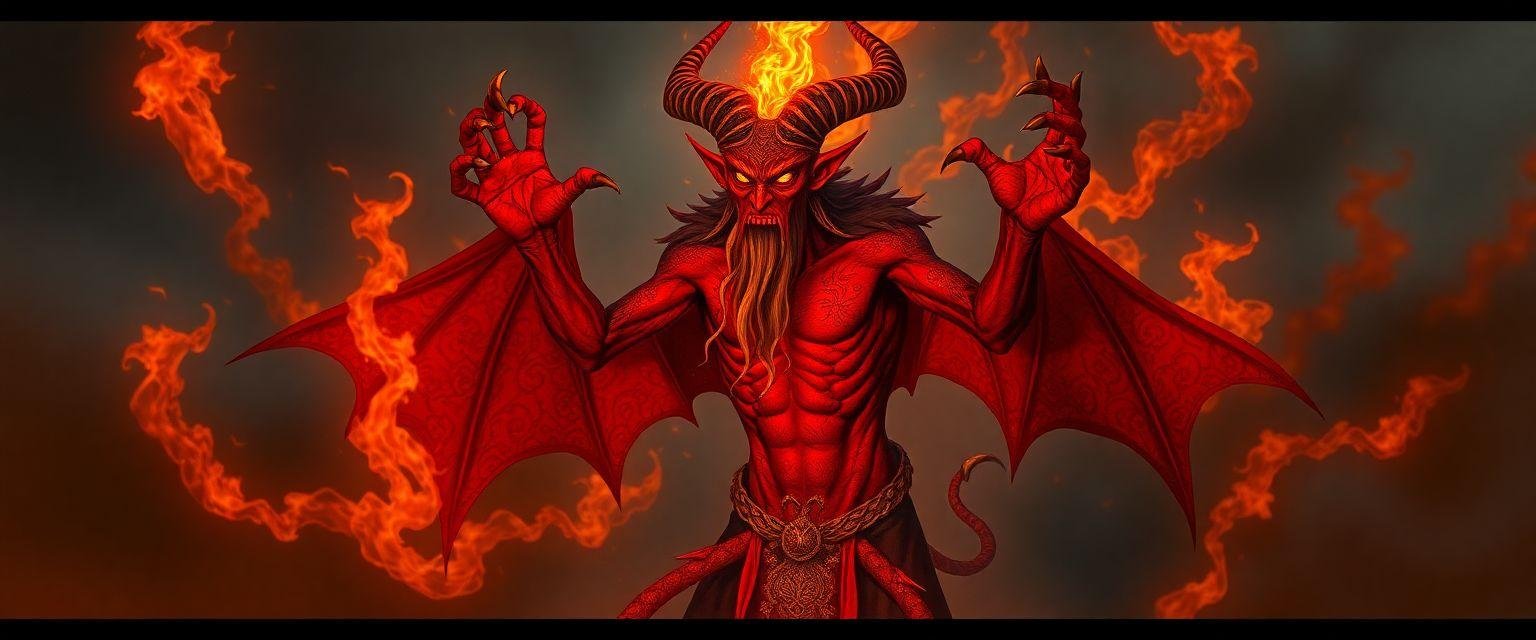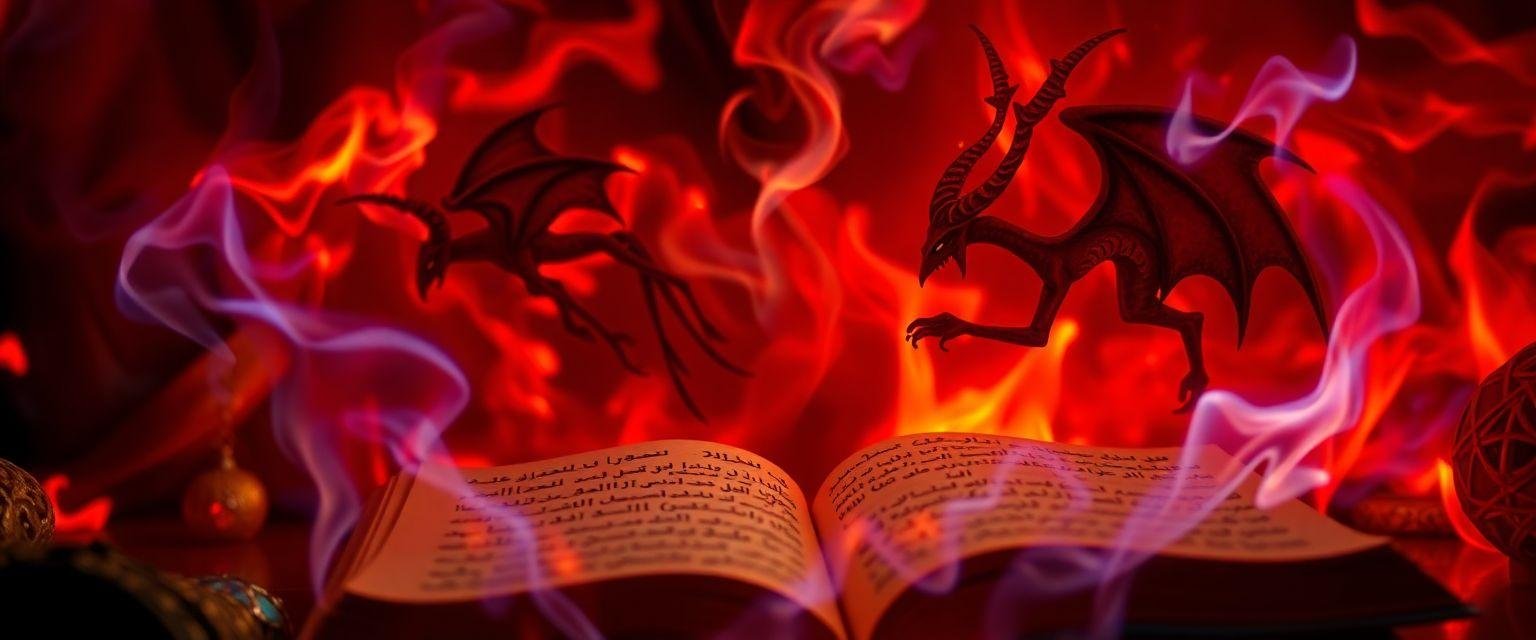Jinn: The Islamic Version of Demons
Imagine a world where unseen beings live alongside us, influencing our lives in mysterious ways. In Islamic tradition, jinn are such beingssupernatural entities created from smokeless fire. Unlike the more familiar Christian demons, jinn possess free will, much like humans. This exploration of jinn aims to contrast their role and perception in Islam with that of demons in Christianity, revealing a complex tapestry of belief that has fascinated and mystified people for centuries.
Understanding Jinn and Demons
Explore the distinctions between Islamic jinn and Christian demons, including their characteristics and cultural significance.
– What are jinn? Jinn are supernatural beings in Islamic theology, created from smokeless fire, with free will similar to humans.
– How do jinn relate to the Quran? The Quran mentions jinn as entities that can influence humans, possessing both good and evil characteristics.
– Protection against jinn: Various practices, such as reciting specific Quranic verses and prayers, are recommended to safeguard oneself from jinn-related disturbances.
What Are Jinn?
Have you ever wondered what lurks in the shadows of ancient folklore? Jinn are intriguing entities in Islamic theology, known for being both benevolent and malevolent. They are mentioned in the Quran as creatures created from smokeless fire, distinct from humans and angels.
Jinn are similar to humans in that they have free will; they can choose to do good or evil. This is a crucial aspect that differentiates them from angels, who are seen as obedient servants of God without free will. Some jinn are believed to be good, even aiding humans, while others are considered mischievous or downright evil. This dual nature makes them both fascinating and fearsome.

From the tales of “Aladdin” to the accounts of exorcisms, jinn have woven their way into many cultural stories. They can appear in various forms, including animals or humans, and they are said to inhabit a world parallel to ours. Many stories detail encounters with jinn, often highlighting their ability to influence human emotions and actions. Their portrayal in literature and media often reflects the cultural context in which they are discussed, varying from friendly helpers to vengeful spirits.
Jinn in the Quran
The Quran, the holy book of Islam, mentions jinn in several verses, highlighting their significance in Islamic belief. Are these references mere allegories, or do they point to a reality beyond our physical world? Surah Al-Jinn, or the Chapter of the Jinn, provides a detailed account of these beings, explaining their creation and purpose.
According to Islamic teachings, jinn were created before humans and were given the earth to inhabit. However, due to their disobedience, they were eventually displaced by humans. The Quran describes how jinn, like humans, will be judged by Allah based on their deeds. This accountability reinforces the idea that jinn possess free will and moral responsibility.

The Quranic narrative emphasizes that some jinn accepted the message of Islam, becoming Muslims, while others rejected it and became devils. This dichotomy underscores their complexity and the diversity within their ranks. The Quran also warns against seeking the help of jinn, emphasizing that they, like humans, are subject to the will of God.
Insider Tip: “In Islamic tradition, it’s crucial to remember that not all jinn are malicious. Some are devout Muslims, living peacefully alongside humans,” says Dr. Amina Khan, a scholar of Islamic studies. Learn more about jinn in the Quran.
Jinn and Humans
The relationship between jinn and humans is a topic rife with mystery and intrigue. How do these invisible beings interact with us, and what impact do they have on our lives? In many Islamic cultures, jinn are believed to be capable of influencing human emotions, thoughts, and actions, sometimes leading to possession or other supernatural occurrences.
Stories of jinn possession are common in many Muslim communities, with traditional healers often called upon to perform exorcisms. These rituals are deeply embedded in cultural practices, blending religious texts with local customs. While some view these practices with skepticism, for many, they provide an essential framework for understanding unexplained phenomena.

The belief in jinn also extends to their ability to form relationships with humans, sometimes even resulting in marriage. Although these unions are often discouraged in Islamic teachings, they highlight the perceived closeness between the two worlds. Moreover, the concept of jinn as protectors or guardians is prevalent in some regions, with many people believing that certain jinn look out for specific individuals or families.
Thought-provoking Question: Can the belief in jinn and their influence on humans be purely psychological, or is there a deeper spiritual reality at play?
Jinn and Christians
The concept of jinn presents an intriguing contrast to the Christian notion of demons. While both are seen as supernatural beings with the potential for evil, their origins, and roles within their respective religious contexts differ significantly. How do these differences shape the way believers perceive and interact with the unseen world?
In Christianity, demons are typically depicted as fallen angels, rebelling against God under the leadership of Satan. They are often seen as wholly evil, with their primary purpose being to lead humans away from God’s path. This contrasts with the Islamic view of jinn, who have the potential for both good and evil, reflecting the complexity of human nature.
The theological implications of these differences are profound. While Christians might seek to cast out demons, Muslims might seek to coexist with jinn, invoking the protection of Allah to ward off any malevolent intentions. This nuanced understanding of supernatural entities challenges the notion of good versus evil, inviting a deeper exploration of the spiritual world.
Insider Tip: “In both Islam and Christianity, the focus is ultimately on the sovereignty of God over all beings, whether human, angelic, or jinn. This common ground can foster dialogue and mutual understanding,” notes Reverend John Mark, an interfaith theologian.
Jinn and the Occult
The allure of the occult often intersects with the belief in jinn, drawing those curious about the supernatural into a world of mystery and danger. How do jinn fit into the broader tapestry of occult practices, and what risks do these interactions pose?
Throughout history, jinn have been linked to various forms of magic and witchcraft. Many cultures believe that jinn can be summoned or controlled through specific rituals, granting humans access to hidden knowledge or supernatural powers. This temptation has led some to dabble in the occult, seeking to harness the power of jinn for personal gain.

However, Islamic teachings strongly caution against such practices, warning that any attempt to engage with jinn in this manner can lead to spiritual harm. The Quran explicitly forbids seeking the aid of jinn, emphasizing the importance of relying solely on Allah for guidance and protection. Despite these warnings, the fascination with the occult persists, drawing many into a world where the line between reality and the supernatural blurs.
Thought-provoking Question: Does the human desire for control over the supernatural reflect a deeper need for power in an unpredictable world?
How to Protect Yourself From Jinn
With the potential for both good and evil, how can one protect themselves from malevolent jinn? Islamic tradition offers various methods to safeguard against the harmful influence of these beings, emphasizing the importance of faith and devotion.
Recitation of specific Quranic verses, such as Ayat al-Kursi (The Throne Verse) and Surah Al-Falaq, is believed to provide spiritual protection. These verses serve as a reminder of Allah’s power and the believer’s reliance on divine protection. Additionally, maintaining a strong connection to one’s faith through prayer and good deeds is seen as a shield against negative influences.

In many cultures, traditional practices such as burning incense or reciting specific prayers are also employed to ward off jinn. While these methods vary across regions, they all underscore the importance of maintaining spiritual vigilance. Ultimately, the belief in jinn serves as a reminder of the unseen forces at play in our lives, encouraging believers to remain steadfast in their faith.
Insider Tip: “Regular spiritual practices, such as prayer and reflection, are key to maintaining a strong defense against any negative influences,” advises Sheikh Omar, a renowned Islamic scholar.
Conclusion
In the intricate dance between good and evil, jinn represent a fascinating aspect of Islamic belief that challenges our understanding of the supernatural. Unlike the uniformly malevolent demons of Christianity, jinn possess a complexity that mirrors human nature, offering both potential peril and promise. Their presence in the Quran and their interactions with humans underscore their significance in Islamic theology, while their role in the occult highlights the dangers of seeking power beyond our understanding.
As we navigate the mysteries of the unseen world, the lessons of jinn remind us of the importance of faith, humility, and the acknowledgment of forces greater than ourselves. Whether one views them as mere allegories or real entities, the stories of jinn continue to captivate the imagination, urging us to question the thin veil between reality and the spiritual realm.







